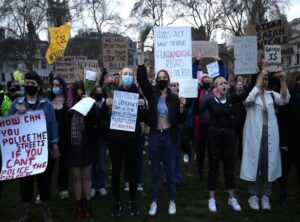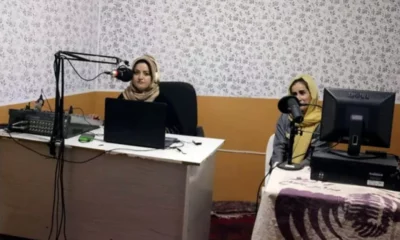Women now feel very unsafe walking home alone at night than they did three years ago, with almost two-thirds now feeling in danger, according to a new research.
This was found out by a Survey carried by YouGov for The Independent. It finds out that almost 63 percent of women who prefer to walk themselves at night time now feel in danger. One in five women choose not to walk alone at night in the first place – twice as much as men.
That’s a 17 point increase compared to the 46 percent of women who reported feeling this way in a survey three years ago.
Campaigners have credited it with undermining trust in the police since the abduction, murder and rape of Sarah Everard by a serving Metropolitan Police officer in March.
The researchers found that the number of women taking persistent measures to protect themselves from sexual assault also increased. In 2018, a third of women said they took precautions, while some 41 percent still say the same.
Leigh Morgan, a senior legal officer for women’s rights, a leading legal rights charity said, “the state is failing to keep women and girls safe by prioritizing cosmetic initiatives over prevention.
“The survey results match what we already know: the state’s focus on creating more police powers and technological gimmicks does nothing to restore the confidence of women and girls who are in the wake of male violence against women and girls.” has failed to address the crisis.”
Her remarks came after a new “888” tracking service for women traveling alone – proposed by BT and backed by Home Secretary Priti Patel – was labeled as “very misguided” and “flawed” by campaigners who fear freedom and privacy was rejected at the beginning of the month. The government’s controversial new policing bill has been widely criticized by campaigners for taking back human rights – with many fearing the law would exacerbate pre-existing over-policing and criminalization of marginalized communities.
 Andrea Simon, director of the Violence Against Women Coalition, said, “This is an attack on our fundamental rights, which is particularly damaging to women’s rights, because of how the movement secures change through protest and resistance. Given its long and ongoing history.”
Andrea Simon, director of the Violence Against Women Coalition, said, “This is an attack on our fundamental rights, which is particularly damaging to women’s rights, because of how the movement secures change through protest and resistance. Given its long and ongoing history.”
The researchers found that women were more likely than men to say they feared in routine day-to-day situations such as exercising at the gym alone, waiting in a pub alone for a friend to arrive, taxiing alone or getting a rideshare, or going on a holiday abroad alone.
Compared to three years ago, more women now expressed apprehension about daily activities, such as walking down the street on their own at any time of the day, increasing from 49 percent to 63 percent.
The number of women concerned about feeling safe to go on a first date increased from 15 percent to 28 percent, and the proportion of women who were afraid to exercise in an outdoor public place increased from 14 percent to 21 percent.
Charlotte Neer, who runs domestic abuse shelters on the outskirts of London, said she didn’t think life had become more dangerous for women, but it was her own perceptions that have been changed.
Ms Neer, chief executive of Regate and Bansted Women’s Aid Refuge in Surrey, said: “The case of Sarah Everard, where she was murdered by a serving police officer, may have raised women’s concerns as it was originally intended to be a case of policemen, changes our perception of what keeps us safe.
“We have been made aware that not only did a policeman kill a woman walking on her own, we have also been told that the police do not take violence against women seriously.”
She said that several other high-profile murders – such as the murders of sisters Biba Henry and Nicole Smallman in London parks, and the death of Sabina Nessa – may have also contributed to the fear.
“We identify women who were thinking of carrying on their business as normal day-to-day operations,” said Ms. Neer, a domestic abuse survivor whose violent partner was sentenced to seven years in prison in 2011.
She also noted that research has found that women were more afraid to step out of the house in the wake of the lockdown as there were fewer people on the streets. She said that this concern could have continued even after the lockdown.
Maya Tuton, who along with her sister Gemma runs the Our Streets Now campaign to end street harassment, revealed that the latest data is “an indictment of our society” as it warned that “pervasive fear” is curtailing the “human rights of women, girls and marginalized groups”.
She said: “The fact that so many women and marginalized groups feel unsafe in a public place clearly shows the scale of male violence in our society.
“What is particularly striking is also the increase in women who are actively taking steps to protect themselves from sexual assault. This mirrors the victim-blaming messages in our society, narratives that perpetuate on women to change their behavior rather than as perpetrators to stop being violent.“
A survey conducted in the spring by UN Women found that 97 percent of young women in the UK said they had been sexually assaulted, while 80 percent had experienced sexual harassment in public places. The survey of more than 1,000 women aged 18 to 24 found that sexual harassment included groping, stalking, and engaging in sexual activity.
Meanwhile, previous research by charity Plan International found that one in three girls in the UK are harassed in their school uniform.




















 Andrea Simon, director of the Violence Against Women Coalition, said, “This is an attack on our fundamental rights, which is particularly damaging to women’s rights, because of how the movement secures change through protest and resistance. Given its long and ongoing history.”
Andrea Simon, director of the Violence Against Women Coalition, said, “This is an attack on our fundamental rights, which is particularly damaging to women’s rights, because of how the movement secures change through protest and resistance. Given its long and ongoing history.”










